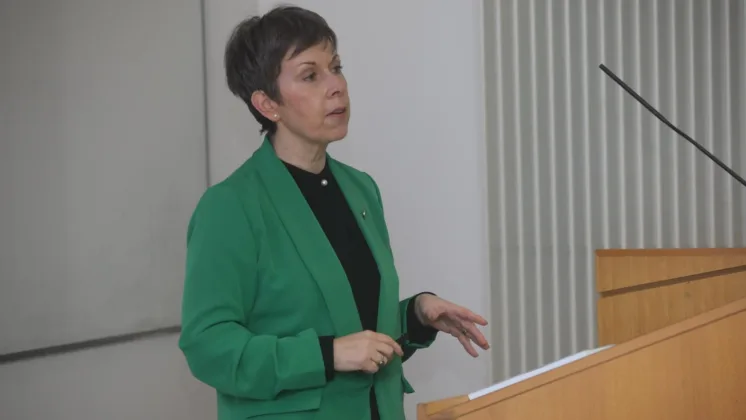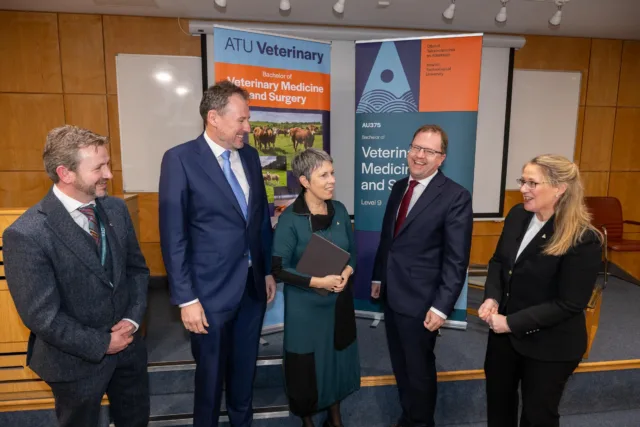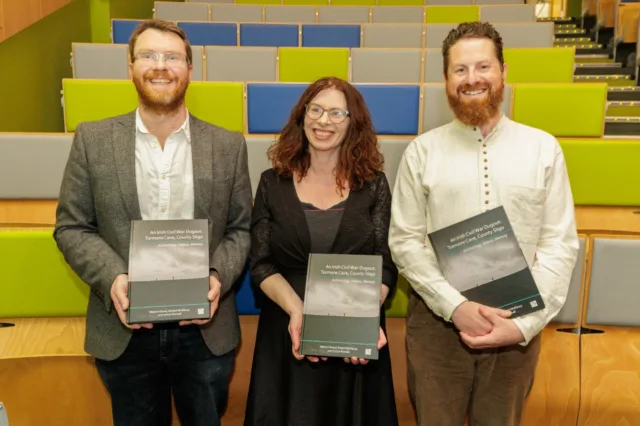Courses
4th edition of Humanitarian Logistics launched at inaugural Operations and Supply Chain Research (OSCAR) symposium in ATU Galway city
In rapidly developing emergencies, it is vital for aid agencies to understand how to establish an agile supply chain that resists the chaos of a crisis and caters to unknown needs.

A new book, “Humanitarian Logistics 4th Edition, Meeting the challenge of preparing for and responding to disasters and complex emergencies”, edited by Professors Graham Heaslip (Atlantic Technological University) and Peter Tatham (Griffith University, Australia) was launched by ATU President Dr Orla Flynn at the inaugural Operations and Supply Chain Research (OSCAR) post graduate research training spring symposium, held in ATU Galway city recently.
The book is essential reading for anyone who needs to understand how to effectively manage supply networks during a rapidly developing emergency. From the distribution of the COVID-19 vaccine, to the providing of relief to victims of natural disasters, to the bringing of resources to a growing number of migrant crises, there is a vital need to understand how to conduct operations in confused and swiftly changing environments. This text contains chapters from a wide range of academics and practitioners who have worked in these situations and offers cutting edge research into how these complex problems can be solved.
Lead editor Professor Graham Heaslip says: “The new edition contains new chapters on “…the challenge of obtaining scarce resources in the aftermath of a disaster, sustainability in a HL context, the logistics of the COVID-19 vaccine, the challenges of procurement in HL, a study of the humanitarian service performance system, cash-based HL systems and the interaction of blockchain and HL.”
Speaking at the launch, ATU President Dr Orla Flynn praised the editors for their thought-provoking guidance and discussion of the core issues facing practitioners involved in managing the logistics of disaster relief: “Why a 4th edition of ‘Humanitarian Logistics’? The simple answer is that, sadly and perhaps inevitably, since the 3rd edition, humanitarian crises have continued to emerge and challenge the international community in how best to respond. As prime examples, the ongoing Syrian crisis, the Covid-19 pandemic and events emerging in Ukraine, cause significant disruptions to humanitarian supply chains, putting those in need in the most vulnerable of positions. The recent earthquake in Turkey and Syria demonstrated the uncertainty surrounding rapid onset events. This leads to the emergence of unexpected demand for products and short lead times for supplies.”
Dr Flynn pointed out that “60-80% of the expenditure of aid agencies is on logistics which includes procurement, warehousing, transport into the affected country, and internal and ‘last mile’ distribution processes. Given that the overall annual expenditure of humanitarian agencies is of the order of $20Bn, the resultant logistic spend of some $15Bn provides a huge potential area for improvement, and consequential benefit to those affected by such disasters/emergencies.”
Further endorsements of the book come from Professor Martin Christopher, Cranfield University, UK: “The need for responsiveness to humanitarian emergencies has never been greater. This excellent book provides valuable insights into how logistics capabilities can be deployed to better cope with crises, before, during and after they happen”.
Martin Blansjaar, Head of International Supply and Logistics, Oxfam, UK, noted: “We have not ended humanitarian crises yet. Fortunately, this text continues to document the ever-changing challenges and learning to keep us al on the from foot. A must-read for all who strive to improve humanitarian supply chains.”
Professor Karen Spens, President of BI Norwegian Business School stated: “The book Humanitarian Logistics could not be more timely. With all the challenges facing those involved in the management of the logistics of disaster relief, offering potential solutions to the problems is truly welcome. This book has been, and will even more so be, a must-read for students, academics and practitioners who want to understand how to tackle the complexity of the networks involved in humanitarian logistics and the world we live in today.”
The book is published by KoganPage, and is available here.





